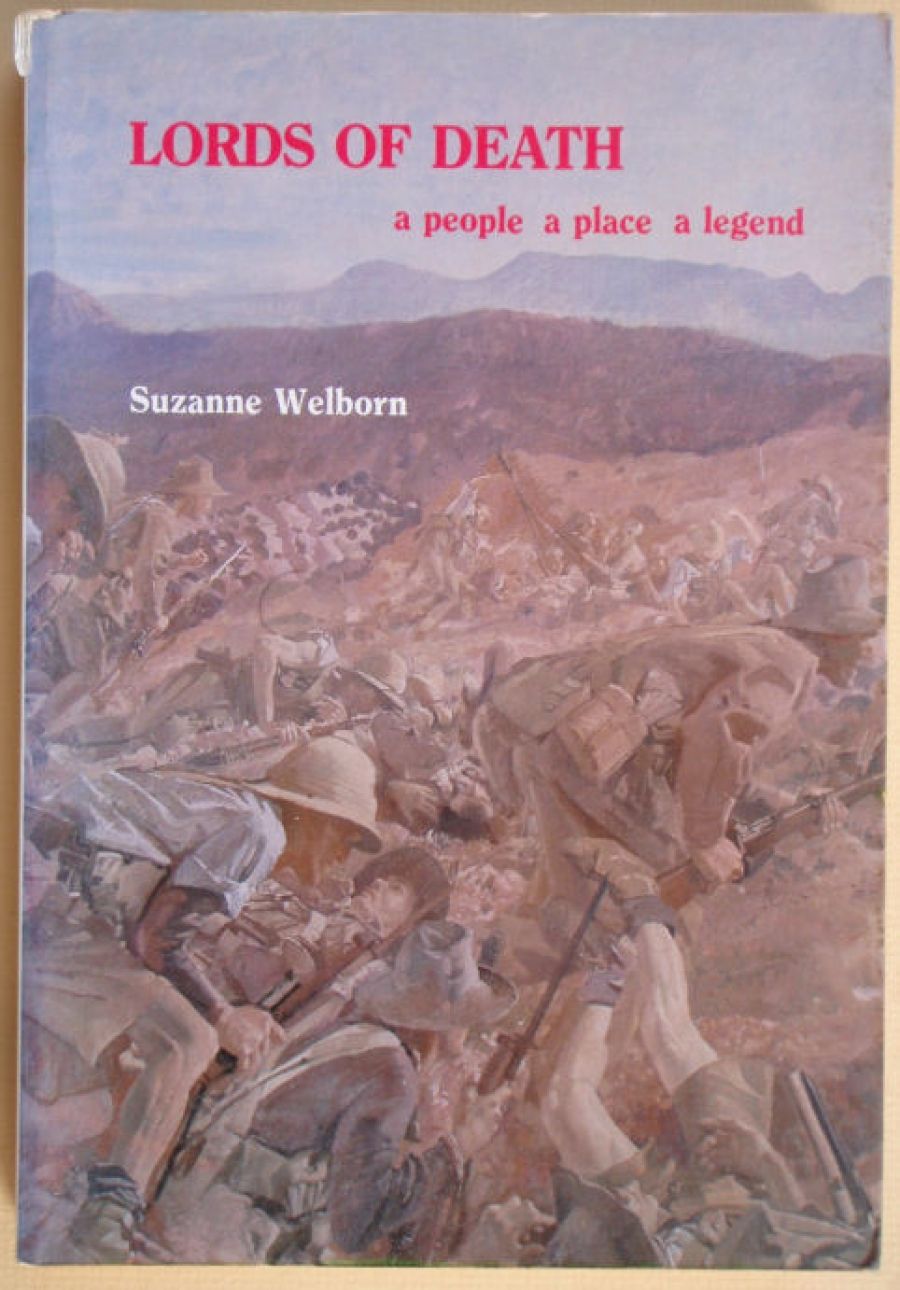
- Free Article: No
- Contents Category: Australian History
- Review Article: Yes
- Online Only: No
- Custom Highlight Text:
This book is concerned essentially with the impact of the environment upon Europeans in Australia. It sets out to test C.E.W. Bean’s thesis that during the Great War the most effective Australian soldiers came from the bush. It does this in relation to men from Western Australia, arguing that the West was one of the most predominantly bush areas of Australia, and therefore that there, if anywhere, the influence of the bush should show up in the achievements of soldiers.
- Book 1 Title: Lords of Death
- Book 1 Biblio: Fremantle Arts Centre Press, $20.00, 223 pp, 0 909144 61 3
This is an admirable purpose. Regional studies are the only effective means by which Bean’s thesis can now be tested. Suzanne Welborn has gone about her task well. She begins by depicting how the bush shaped Europeans in Western Australia before the war. This is very difficult to do briefly, because it is necessary to go beyond generalisation to examples both concrete and illuminating, but Welborn succeeds, drawing an evocative picture of what life was like in Western Australia before 1914, and supporting it with skilfully presented illustrations. The result is very good history, and extremely fine literature. These first two chapters are the best in the book, and they alone make it worthwhile.
Welborn then describes the work and experiences of West Australians at the war. She rests her narrative on soldiers’ diaries, letters and reminiscences, supported by a statistical analysis based on attestation papers from three WA units, the eleven and twenty-eight Battalions, and the ten Light Horse. She concludes that WA soldiers were indeed lords of death: fitted by a harsh land to know adversity and face it bravely, trained by years of resource and endurance to a superior ability in battle, and more likely to die because the generals recognized this. Tough environments, in other words, select particular qualities in men.
Three passing observations. I think there was a difference between the bush and the Great War: possessing the right qualities made survival more likely in the bush, but less likely in the war, because good troops were used more in tough battles. This is why the bush generated Australian distinctiveness, whereas the war began to destroy it. Second, the belief in Australia that bushmen made the best soldiers goes back at least to the South African War, and may have had its origins in attempts to predict or explain why relatively untrained men could still be good soldiers. Was that belief made self-fulfilling in the Great War? Finally, I am not sure that emphasizing the harshness of the bush is apt: what does this imply about New Zealanders, for example, who were superb solders?
Yet the main thesis stands. I do not doubt that by and large bushmen made the best soldiers in the AIF. I agree with Bean that the most effective battalions were generally those from the bush states, that is those except New South Wales and Victoria. However, I think Welborn goes too far in attempting to prove that WA soldiers were superior to those from the other bush states, and I am sorry she made the attempt, for it was not necessary unless WA was significantly more bush based than anywhere else, which was not so. Of necessity Welborn generally compares statistics from her three WA units with those for the AIF as a whole, which avoids a comparison with the other bush states. The question of whether WA was truly distinctive must at least await similar statistical work similar on those other states, although personally I doubt whether this would reveal anything new, and I did not find Welborn’s statistics particularly useful: they show a statistician’s respect for the results rather than a historian’s scepticism about the sources.
Although not so liberally as Patsy Adam-Smith or TV, Welborn has borrowed from my work without acknowledgement (and in return misrepresented The Broken Years in the only reference she makes to it). There are also a few minor errors of fact, but generally the scholarship is solid, and the style is outstanding. In precise and poetic language Welborn unfolds a memorable account of young men and a young country. This is a good book, a tribute to the men of the West, and a valuable addition to the story of Europeans in Australia.


Comments powered by CComment